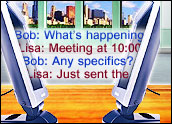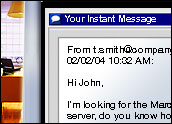Using the Internet to ease access to government services seems obvious today. When Ed Trimble founded EzGov five years ago, however, he had to play the role of evangelist, touting the security and capabilities of the Web.
A few months after EzGov was incorporated, it sold its first application — a property tax payment system — to Dekalb County, Georgia. Now it serves governments all over North America and Europe.
Recently the E-Commerce Times talked with Trimble about the government market, the company he cofounded with Bryan Mundy, and the challenges of supporting government agencies in their adoption of technology.
E-Commerce Times: Could you describe EzGov in your own words?
Trimble: Absolutely. We are an e-government solutions company. We are working with all different levels of government — state, local, and federal here in the U.S., and central governments over in Europe. Our goal is to help government become more efficient and better serve its constituents — which can be citizens, businesses or other government agencies — by leveraging the Internet.
We do that specifically with our software package called FlexFoundation. Along with our partners, we deliver specific solutions to the government, whether it’s tax filing or driver’s license renewal or online immigration forms.
I’d imagine that over five years, you’ve seen an awful lot of changes in government adoption of online solutions.
Trimble: Back in 1999, it was a time of experimentation. We were working with a lot of pioneers, and a lot of our job was educating government officials about the potential of the Internet. Today so much business is done online that everybody understands the potential.
What types of return on investment are agencies hoping to accomplish?
Trimble: Government is unique in that it’s a monopoly. It’s not under the same kinds of pressures as corporate America, so the buying patterns are a little bit different. Government is about being more efficient but also about improving the experience of the customer — the constituent. Some of that is driven by people simply looking to improve government, some by people who are looking, quite frankly, to achieve some political gain by making those improvements.
We help agencies quantify the value of these solutions and really make sure there is a sound business case backing up the decision. That’s the biggest change I’ve seen in buying patterns: Governments are now looking to see a short-term return on these investments that they’re making.
Why is that?
Trimble: Certainly, the budgets are constrained, particularly at the state and local levels. And I also think we have a better-educated buyer. The days of experimentation and trials are over.
Has the sales cycle changed at all?
Trimble: It’s no secret that the sales cycle with government is certainly very long. I have not seen that change over the past five years.
Another big factor in the government’s decision to move forward with this is that the state next door or the country next door may be providing a service, and that government’s constituents begin expecting that service. They ask, “Why can my neighbor in the next state renew a driver’s license online, but I still have to go to the DMV?”
With the presidential election coming up, where do you think we stand with e-voting?
Trimble: We’ve recognized that, while there’s a huge opportunity there — a huge need there — the requirements for security and for stability, end-to-end, are extremely high, and the margin for error is extremely low. We’ve always seen that as one of the later solutions to be delivered to governments.
There are a lot of issues still out there today in terms of a lack of consistent standards around how the voting is administered and also how it’s audited. There is a Help America to Vote Act that is promising standards by 2006. When that happens, you’ll see much broader adoption.
Internet voting is that much further away because the issues are multiplied when you talk about administering voting remotely. It’s just a matter of time. Governments are moving cautiously. I think we would expect them to and hope them to.
What are some of the main concerns government agencies have when they consider moving activities or departments online?
Trimble: In the early days, security was at the top of everyone’s list, and it’s still an important concern. But the fact that people are banking online, managing investment portfolios online, making travel arrangements — the same technology that supports secure transactions is being used by EzGov and others to support government’s online transactions. It’s still a concern, but it’s a very addressable concern.
I think governments are also concerned that they’re implementing solutions that are flexible, that are not “siloed” — you hear that term a lot with government agencies. They’re trying to avoid systems that don’t interact, making sure any e-government solution they put in place is flexible and can support changing needs.
The last thing I’d mention is the total cost of ownership of the system. I think government, like business, has learned that the cost of deploying a new IT system has an upfront cost and an ongoing cost, and they have to be aware of the ongoing costs. That’s a big part of what we provide. FlexFoundation, as a platform, is a software-based, out-of-the-box solution that EzGov maintains and supports. Governments reap huge benefits from that compared to custom-developed software.
What makes FlexFoundation different from other solutions out there?
Trimble: FlexFoundation is a platform, a software platform, which supports much more rapid and stable delivery. The government agency gets 60 to 70 percent of their solution right out of the box.
So all of that internal architecture and processing — from taking an online payment to displaying and capturing an online form to processing a business rule — is, in FlexFoundation, right out of the box. Then we will go in to help the government agency build the remaining 30 to 40 percent of the specific solution, whether it’s tax filing, tag registration or paying property taxes.
We feel it’s the right balance between out-of-the-box functionality and flexibility.
Which brings up an interesting point: Since more industries — like healthcare, for example, are becoming regulated, are there things other verticals can learn from government and companies like EzGov that cater to government?
Trimble: Yes, government — in terms of processing — has significant amounts of information, often forms that are being completed by citizens and businesses. In the case of the Inland Revenue Service in the U.K., we delivered a massive, highly secure, highly scalable online system that rivals any in the commercial sector in the world. So I think when you look at industries that have similar needs — insurance, education, healthcare — there are technologies out there supporting government that could serve those industries well. That’s something that EzGov is looking at as we map out our future — the ability to support other industries.
Yes, I was going to ask if you were considering moving into any other vertical markets.
Trimble: We have. As you know, the lines between government and other industries, such as healthcare, are blurry. In many other countries, healthcare is part of the public infrastructure.
How much work do you do internationally versus in the U.S.?
Trimble: Just over half of our business is actually in Europe. Europe, specifically the U.K., has moved really aggressively with its e-government programs. Several years ago, [British Prime Minister] Tony Blair issued a mandate that by 2005 he wanted 100 percent of government services available online, and he went a step further and actually allocated the budget to support that.
There’s been a huge push in the U.K., and we’ve been right in the middle of supporting that transformation — at Inland Revenue, at the Department of Works and Pensions, at U.K. Justice — to bring these types of solutions online. The U.K. government has been, in many ways, well ahead of most other countries in the world.
How have you managed to have headquarters in Atlanta and still be so successful abroad?
Trimble: We get asked that question a lot. Being a young company, a relatively small company, we’ve done that by delivering the technology and combining that with very knowledgeable local resources on the ground in these countries. We have offices in Atlanta, Washington, D.C., and London, and then in Amsterdam, we have our European delivery center. Early on, we recognized that if we were going to do business in Europe, we needed a strong presence in Europe.
A lot of companies have failed, haven’t they, because they have believed they can sell abroad without having much of a physical presence?
Trimble: These are complex problems that we’re helping governments solve, and you really have to treat it like a partnership; you have to roll up your sleeves and get in there with them.
Who are your competitors?
Trimble: Today, it’s the large integrators that are doing custom solutions. It’s an interesting dynamic because, in many cases, these integrators will be our partners, and in other cases, they’ll be our competitors. We strongly believe that, over time, government will broadly standardize COTS — commercial off-the-shelf software — to support these types of solutions, and we think FlexFoundation is squarely positioned to be that leading package.
You’ve already addressed some of the benefits you believe off-the-shelf versus 100 percent custom solutions provide, but isn’t time also a big benefit?
Trimble: Yes. Our solutions typically run two to four months. These are very complex, transaction-based installations, and often there’s skepticism when we talk about delivering these new systems in three months, four months. But then that skepticism turns into confidence and huge victories as the systems are delivered. That is a huge advantage of the COTS alternative — speed to market — and we’ve proven that over and over again with our customer base.
As you say, you “eat, sleep and breathe” government. Did you come from a government background?
Trimble: I did not. I came from an information technology background. I worked for Accenture for a number of years and then for a couple of smaller software companies. I saw back in 1998, early 1999, the opportunity to help government go online.
Also, in our early days, we put together a board of directors that included folks like [former nine-term congressman from New York] Jack Kemp, New York Governor Mario Cuomo — folks who had deep, significant experience in government, and that was certainly helpful as we got the company off the ground.
And how did you manage getting people like Cuomo on board?
Trimble: We approached Jack Kemp, Governor Cuomo, Zel Miller — the former governor of Georgia, now a senator from Georgia — Elaine Kamarck, who was with Al Gore in the White House and who is now a professor at the Kennedy School [of Government] at Harvard. These folks, without exception, saw the vision, embraced the vision, and agreed to join the board. For them, it’s about improving government. That’s the reason they got into public service life in the first place.
I should mention that Elaine Kamarck is still on our board; Jack Kemp is still on our board. Zel Miller had to resign when he took his Senate seat, and Mario Cuomo has recently left the board. It’s a great group and we’re very lucky to have them.
Since government agencies aren’t really competing, do you find them more willing to recommend you via word-of-mouth?
Trimble: Absolutely. It’s a very tight-knit community. The vast majority of people working for these government agencies are in it for the right reasons, and they’re looking to improve government. If they find a new technology, a new way of doing business that is an improvement on the old way of doing business, they’re going to share that. That has absolutely been our best marketing strategy — creating happy customers and having those happy customers talk to their peers.
Has there ever been an occasion when you, as a citizen, have used EzGov’s technology?
Trimble: When we started this company back in 1999, I stood for an hour in the DMV in Georgia, and I was thinking, “This is absolutely crazy. We’re going to change this.” Just last August, I renewed my driver’s license online in Georgia using the EzGov system. It took 10 minutes. Yes, you get a lot of pride in seeing first-hand how you’re helping to make government more accessible and more customer-friendly.
Which department or agency would you like to see adopt FlexFoundation next?
Trimble: We’re literally in discussions with hundreds of agencies around the world. Government moving online is an industry that’s really in its infancy. We see so much opportunity.
Is there anything you miss from working with the commercial sector?
Trimble: No. From a personal perspective, this is a dream job. We are doing something that’s changing government, that’s changing the world, that’s really making a difference. We’re pioneers. That’s exciting. At the same time, we’re building a global company that’s employing a lot of very bright people and really enjoying this shared experience. So I couldn’t be happier professionally with how things are going at EzGov.
What do you like to do when you’re not working?
Trimble: Playing soccer with my 5-year-old and 3-year-old. I helped coach T-ball this year. They’re a lot of fun. A lot of time with the family. I do occasionally get out on the golf course.
One great thing about EzGov is I get to do a lot of traveling. I get to meet a lot of people in a lot of different places. It’s really exciting to get the world view on the e-government movement and to see that all these governments are facing a common set of challenges, whether they’re in the Middle East, the U.K., the Caribbean, the U.S. e-government technologies like FlexFoundation have a great potential to address many of those challenges.






















































Social Media
See all Social Media